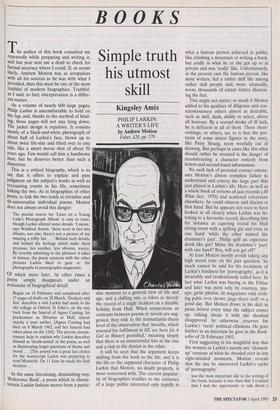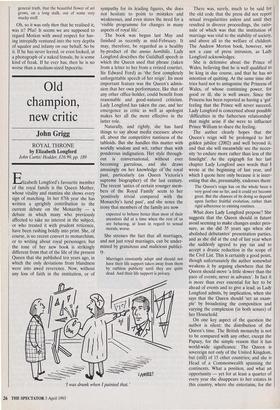BOOKS
Simple truth his utmost skill
Kingsley Amis
PHILIP LARKIN: A WRITER'S LIFE by Andrew Motion Faber, £20, pp. 570 The author of this book consulted me repeatedly while preparing and writing it, and last year sent me a draft to check for factual accuracy where I could. If, as seems likely, Andrew Motion was as scrupulous With all his sources as he was with what I provided, then this must be one of the most truthful of modern biographies. Truthful, as I said, to fact; interpretation is a differ- ent matter.
As a volume of nearly 600 large pages, Philip Larkin is uncomfortable to hold on the lap, and, thanks to the method of bind- ing, those pages will not stay lying down. The jacket design is repulsive. It consists mostly of a black-and-white photograph of about half of Larkin's face, blown up to
This is a critical biography, which is to say that it offers to explain and pass judgment on the subject's works as well as recounting events in his life, sometimes linking the two. As in biographies of other poets, to link the two tends to trivialise and de-universalise individual poems. Motion does not always avoid this danger:
The precise source for 'Lines on a Young Lady's Photograph Album' is easy to trace, though Larkin altered some details. 'I mean,' says Winifred Arnott, 'there were in fact two albums, not one; there's not a picture of me wearing a trilby hat . . .' Behind such details, and behind the feelings which make them precious, lies another, less obvious, source. By covertly admitting to the pleasure it takes in fantasy, the poem connects with the other pictures Larkin liked to gaze at: the photographs in pornographic magazines.
Of which more later. At other times a Poem simply disappears under an avalanche of biographical detail:
Begun on 14 February and completed after 15 pages of drafts on 28 March, 'Dockery and Son' describes a visit Larkin had made to his old college at Oxford, St John's, on the way back from the funeral of Agnes Cuming, his predecessor as librarian at Hull, almost exactly a year earlier. [Agnes Cuming had died on 8 March 1962, and her funeral had taken place on the 12th]. The precise circum- stances help to explain why Larkin describes himself as 'death-suited' in the poem, as well as illuminating larger questions of theme and mood .. . [The poem] was a good last choice for the manuscript Larkin was preparing to send Monteith. On 11 June he made his final decision ...
In the same literalising, diminishing way, `Reference Back', a poem which in charac- teristic Larkin fashion moves from a partic-
ular moment to a general view of life and age, and a chilling one, is taken as merely the record of a single incident on a datable holiday from Hull. When connections or contrasts between poems or novels are sug- gested, they sink to the transatlantic-thesis level of the observation that `mouths, which yearned for fulfilment in Jill, are here [in A Girl in Winter] punished,' meaning simply that there is an unsuccessful kiss in the one and a visit to the dentist in the other.
It will be seen that the argument keeps shifting from the work to the life, and it is the life or the supposed character of Philip Larkin that Motion, no doubt properly, is most concerned with. The current popular- ity of biographies testifies to the existence of a large public interested only tepidly in what a famous person achieved in public, like climbing a mountain or writing a book, but avidly in what he or she got up to in private and was `really' like. Unfortunately, in the present case the famous person, like most writers, led a rather dull life among rather dull people and, more unusually, wrote thousands of extant letters illustrat- ing the fact.
This might not matter so much if Motion added to his qualities of diligence and con- scientiousness others almost as desirable, such as skill, dash, ability to select, above all humour. By a second stroke of ill luck, he is deficient in all of them. These short- comings, or others, see to it that the por- traits of some minor figures in the story, like Patsy Strang, seem woefully out of drawing. But perhaps in cases like this what should rather be stressed is the danger of reconstructing a character entirely from letters and second-hand information.
No such lack of personal contact extenu- ates Motion's almost complete failure to understand and convey the large part that jazz played in Larkin's life. Here, as well as a whole book of reviews of jazz records (All What Jazz, 1970) and scattered references elsewhere, he could observe and discuss at first hand. But he appears not even to have looked at all closely when Larkin was lis- tening to a favourite record, describing him for instance as capering round his Hull sitting-room with a spilling gin and tonic in one hand 'while the other mimed the drummer's part'. Philip spill an expensive drink like gin? Mime the drummer's `part' with one hand? Boy, will you get off?
At least Motion mostly avoids taking any high moral tone on the jazz question. So much cannot be said for his treatment of Larkin's fondness for `pornography', as it is invariably and tendentiously called here. In fact what Larkin was buying in the Fifties and later was porn only by courtesy, pin- ups, girlie photos, tit magazines with noth- ing pubic ever shown, page-three stuff nn a good day. But Motion draws in his skirt in pious horror every time the subject comes up, talking about it with the shocked disapproval he otherwise reserves for Larkin's `racist' political effusions. He goes further in an interview he gave in the Book- seller of 26 February 1993.
First suggesting in his insightful way that the women in Larkin's poems are 'cleaned- up' versions of what he drooled over in less right-minded moments, Motion reveals that the day he uncovered Larkin's cache of `pornography'
was the most important day in the writing of the book, because it was then that I realised that I had the opportunity to talk about a
general truth, that the beautiful flower of art grows, on a long stalk, out of some very mucky stuff.
Oh, so it was only then that he realised it, was it? Pfui! It seems we are supposed to regard Motion with awed respect for hav- ing intrepidly ventured into the very depths of squalor and infamy on our behalf. So be it. If he has never leered, or even looked, at a photograph of a naked female, he is some kind of freak. If he ever has, then he is no worse than a medium-sized hypocrite.



















































 Previous page
Previous page